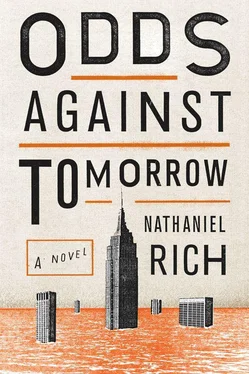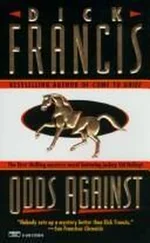“Mr. Nybuster.”
Nybuster turned. He appeared surprised to learn that Mitchell could speak. In fact he appeared surprised to see that a third person was present in the room.
“I’d like to tell you what’s going happen in about ten years, once Beijing attacks. Before the first missile lands in Times Square, Nybuster, Nybuster, and Greene will be ruined. And I don’t just mean the firm. I mean your private wealth, your legacy, your next of kin.”
Nybuster squinted uncertainly.
“Come again?”
“It’s going to be ugly,” said Mitchell. In his mind he saw a body levitating above an operating table in a paroxysm of infinite agony. He allowed his fear to radiate out of his eyes. He would use the fear.
“Go on.” Nybuster seemed, for the first time all meeting, to be listening. He scooted back to his seat. “I want to hear the ugly.”
“OK,” said Mitchell. “Right. Well, for instance, China blockades Taiwan.” Mitchell hesitated, glancing at Charnoble. Charnoble was nodding eagerly, grateful.
“China has threatened it before,” Mitchell continued. “It’s just a matter of time before it happens. The Taiwan Relations Act mandates that any act of aggression against Taiwan be considered a threat to the security of the United States and will trigger the use of military force.”
Nybuster nodded, taking this in.
“The U.S. sends missile carriers to the Taiwan Strait. China bombs Taipei. The U.S. bombs Beijing. China starts firing intercontinental ballistic missiles at San Francisco, Los Angeles, and Seattle. Jin-class submarines surface off the Atlantic coast, launching warheads at Boston, Miami, Washington, D.C., and New York.”
“Mm.”
“Nybuster, Nybuster, and Greene’s employees will all have fled the city for the heartland, or Canada, or Mexico. Or they’ll have died. Either way, it’s irrelevant. The country as we know it will be gone. Where the major cities once stood, there will now be only radioactive wasteland. The economy as we know it will cease to exist, and every equity — except some of those listed on the Hong Kong and Shanghai exchanges — will plunge close to zero. The dollar will be inflated beyond all possible utility, and those unlucky enough to survive the initial blast will be forced to employ a highly volatile bartering system, with water and food the most expensive commodities.”
“Good God,” said Nybuster. “But you’re not exactly telling me anything new, are you? Or particularly useful. Listen, I’m out of time.”
“But there’s a more likely scenario,” said Mitchell. He felt something powerful moving through him now, a dark energy. “China blockades Taiwan; the U.S. sends missile carriers to the Taiwan Strait. China threatens to bomb Taipei — but they don’t act. They’re not stupid. Sure, they’ve threatened a first-strike nuclear attack at the first sign of U.S. aggression, but they don’t want to bring on the apocalypse. Taiwan isn’t worth the loss of every major Chinese city, the massive destabilization of the yuan, the collapse of the economy.”
“Right, but—”
“Imagine, instead, a low-grade attack. Chinese sleeper agents are activated in every major U.S. city. Cyberattacks strain the electrical grid, checkerboarding it. Kidnappings, corruption, political murders begin to occur. Slowly at first, then more frequently. Why? No one knows. Policemen are assassinated by the dozen. Prominent journalists begin to vanish. The managing partner of your own firm is going out for his early-morning swim at his home on Long Island when a band of Chinese agents stun him with a taser and throw him into the back of an armored truck. Your managing partner wakes up in a dungeon, four levels below Canal Street, his wrists cinched to his ankles, an apple in his mouth.”
“Are you aware,” said Nybuster, in an uncharacteristically quiet voice, “are you aware that the managing partner of Nybuster is my father?”
“Certainly he didn’t mean to suggest,” said Charnoble, “in a manner of speaking—”
“That will be fine,” said Nybuster. “Zukor, you have my attention. Please, continue. By all means — continue. What happens to my father in the dungeon? Begin with the part about the apple.”
8.
The pitiful little cardboard box containing Mitchell’s possessions from Fitzsimmons Sherman awaited him at the FutureWorld office, accompanied by a brown envelope imprinted with the familiar sketch of the canoe and the girl with X ’s for eyes — the latest missive from the Maine hinterland. Elsa had enclosed an article from a scholarly journal, Current Biology , titled “The Fearless Wonder.” The subject of this study was a forty-four-year-old Iowa woman, Sarah Axon, who possessed a deformed amygdala — the almond-size mass of nuclei in the brain that controls the processing and recognition of fear. If the Brugada syndrome was a human worst-case scenario, Sarah Axon’s condition approached a human best-case scenario. When her amygdala was damaged by a childhood fever, she lost the ability to experience fear. But other than that she was unchanged. The study described how she handled snakes and tarantulas with glee, frolicked through haunted houses, and returned at night to a park where, just days earlier, a man had threatened to kill her. The aggressor, a “drugged-out” derelict, had stuck a knife to her throat, yelling, “I’m going to cut you, bitch!” To which Sarah Axon placidly responded, “If you’re going to kill me, you’re going to have to go through my God’s angels first.” The man with the knife ran away screaming.
When asked why she would reach into the mouth of a snake that she knew to be poisonous, and caress, with unusual tenderness, its flicking tongue, Sarah explained that she had been overcome with “curiosity.” The word recurred frequently in the article. Sarah was curious to know what a haunted house monster’s face felt like, so she poked it (causing the person wearing the costume to recoil in fear). When she was asked what went through her head when she watched horror movies, she replied, “I experience an overwhelming feeling of curiosity.”
Fine — good story. But why would Elsa send it to him? She was like an alien who beamed into his office once or twice a week with bulletins from a planet in some distant solar system where the laws of gravity didn’t exist. Down was up, dark was light, and no one was afraid of anything. Elsa and Sarah Axon and the rest of their kind lived suspended in a permanent condition of hopeful, childlike, brainless bliss. Did they come from some highly evolved future, or were they refugees from a distant, primordial past? Logic would say the former: evolution ruled against the fearless. The dodo, the most trusting and friendly animal that mankind had ever encountered, was first identified in 1581. The bird was extinct less than a century later.
On the final page Elsa had scrawled a comment in the white space at the end of the article. “I wonder if there’s a correlation between fear and curiosity,” she wrote. “More fear = less curiosity about the actual world?”
Mitchell puzzled over this. Was Elsa chiding him? He doubted it — she was too generous, too uncalculating — but the question unnerved him. It was a question, after all, that Mitchell often put to himself. By focusing on the worst-case scenarios, did he cut himself off from the smaller, but more immediate problems? The personal crises, the mundane dramas and trials that had everything to do with daily life but nothing to do with the larger-scale crises? Was his whole fascination with worst-case scenarios in some way frivolous? A lark?
A glance at his odds-of-death chart (death by earthquake, 1 in 153,597; death by air accident, 1 in 5,862; death by accidental poisoning, 1 in 139) was enough to call back the cold reality of the numbers. Worst-case scenarios did come to pass, after all, and if FutureWorld didn’t worry about them, who would? He was on the vanguard of a new industry — nightmare analysis — and he was proud of it too. He was a fear professional now, and he was being paid lucratively for the specialized skills he brought to the job.
Читать дальше












